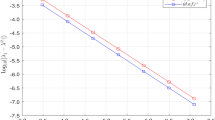Abstract
Sparse grid methods represent a powerful and efficient technique for the representation and approximation of functions and particularly the solutions of partial differential equations in moderately high space dimensions. To extend the approach to truly high-dimensional problems as they arise in quantum chemistry, an additional property has to be brought into play, the symmetry or antisymmetry of the functions sought there.
In the present article, an adaptive sparse grid refinement scheme is developed that takes full advantage of such symmetry properties and for which the amount of work and storage remains strictly proportional to the number of degrees of freedom. To overcome the problems with the approximation of the inherently complex antisymmetric functions, augmented sparse grid spaces are proposed.
Similar content being viewed by others
References
K. I. Babenko (1960) ArticleTitleApproximation by trigonometric polynomials in a certain class of periodic functions of several variables Soviet Math. Dokl. 1 672–675 Occurrence Handle0102.05301 Occurrence Handle121607
Bungartz, H. J., Griebel, M.: Sparse grids. In: Acta Numerica, pp. 1–123. Cambridge: Cambridge University Press 2004.
Flad, H. J., Hackbusch, W., Schneider, R.: Best N-term approximation in electronic structure calculations. II. Jastrow factors. Max-Planck-Institut für Mathematik in den Naturwissenschaften, Leipzig, Germany, Preprint 80/2005.
Griebel, M., Hamaekers, J.: Sparse grids for the Schrödinger equation. M2AN (submitted).
Le Bris, C.: Computational chemistry from the perspective of numerical analysis. In: Acta Numerica, pp. 363–444. Cambridge: Cambridge University Press 2005.
J. Pople (1999) ArticleTitleNobel lecture: Quantum chemical models Rev. Mod. Phys. 71 1267–1274 Occurrence Handle10.1103/RevModPhys.71.1267
S. A. Smolyak (1963) ArticleTitleQuadrature and interpolation formulas for tensor products of certain classes of functions Dokl. Akad. Nauk SSSR 4 240–243
H. Yserentant (1986) ArticleTitleOn the multi-level splitting of finite element spaces Numer. Math. 49 379–412 Occurrence Handle0608.65065 Occurrence Handle853662 Occurrence Handle10.1007/BF01389538
H. Yserentant (1992) Hierarchical bases R. E. O'Malley (Eds) et al. Proc. ICIAM 91 SIAM Philadelphia 256–276
H. Yserentant (2004) ArticleTitleOn the regularity of the electronic Schrödinger equation in Hilbert spaces of mixed derivatives Numer. Math. 98 731–759 Occurrence Handle1062.35100 Occurrence Handle2099319 Occurrence Handle10.1007/s00211-003-0498-1
H. Yserentant (2005) ArticleTitleSparse grid spaces for the numerical solution of the electronic Schrödinger equation Numer. Math. 101 381–389 Occurrence Handle1084.65125 Occurrence Handle2195349 Occurrence Handle10.1007/s00211-005-0581-x
Yserentant, H.: The hyperbolic cross space approximation of electronic wavefunctions. Numer. Math. (in print).
Zenger, C.: Sparse grids. In: Parallel Algorithms for Partial Differential Equations. Proc. (Hackbusch, W., ed.), Kiel 1990, pp. 241–251. Notes on Numerical Fluid Mechanics, Vol. 31. Braunschweig Wiesbaden: Vieweg 1991.
Author information
Authors and Affiliations
Corresponding author
Rights and permissions
About this article
Cite this article
Yserentant, H. Sparse Grids, Adaptivity, and Symmetry. Computing 78, 195–209 (2006). https://doi.org/10.1007/s00607-006-0175-1
Received:
Revised:
Published:
Issue Date:
DOI: https://doi.org/10.1007/s00607-006-0175-1




